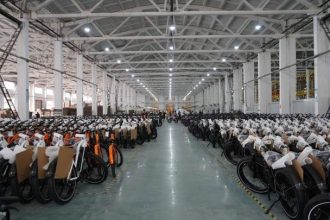The war in Ukraine came suddenly. U.S. Intelligence reports had been warning of potential conflict in Ukraine for several weeks prior to Russia’s invasion, but few people took these reports seriously, hence global surprise when the war actually began.
The war hasn’t just displaced millions of Ukrainian citizens, it has also been the catalyst for a global economic downturn. Food prices are higher than ever, unemployment is increasing, and an unprecedented recession is just around the corner. Things were already bad financially after the COVID pandemic; the war in Ukraine has exacerbated an already bad situation.
This post will explore how the war in Ukraine has impacted the global economy:
Production Chains
One important way that the Russo-Ukrainian war is negatively impacting the global economy is because it is causing production chain disruptions. In an article, René Feregrino Cerón, the senior advisor to Mexico’s leading investment group Invexia, explains that even though Russia is only Mexico’s 35th global trading partner, it is an important producer of aluminum and palladium, which are used in catalytic converters. Mexico’s automotive industry is one of the nation’s largest and most lucrative industries. Mexico isn’t the only nation being affected by production chain shortages, however– nor is the automotive industry the only industry being impacted by shortages. Any industry or nation that relies on Ukraine or Russia’s exports is no doubt suffering.
Oil Supplies
Global oil prices are soaring. The reason for this is that Russia is one of the world’s largest oil suppliers. Because Western nations are sanctioning them, prices are rising. Russia has even demanded that Western nations pay for their oil in Roubles, which Western leaders are refusing to do. Western leaders convened to discuss the Russian oil problem and consequently decided to reduce their reliance on Russian oil, choosing to buy it elsewhere or to begin using more sustainable methods. This has led to oil prices going through the roof.
Agriculture
Ukraine is one of Europe’s primary agricultural exporters. Because of the ongoing conflict, Ukrainian farmers are unable to harvest crops. This has resulted in huge food price increases, throughout the Western world. In some parts of Africa, it is leading to what experts are predicting will become a series of devastating famines. The world was already suffering financially because of the COVID-19 pandemic. Food prices were up during the pandemic and there were shortages in some countries. Now, with this conflict in Eastern Europe taking place, food prices are even higher, which is leaving ordinary people in the uncomfortable position of having to choose between heating their homes and eating.
Energy Bills
As already mentioned, the cost of oil is skyrocketing. This has in turn led to energy prices rising. In places like the United Kingdom and Germany, energy prices are reaching highs that have never been seen before. In combination with food prices rising, people are having to make very difficult decisions. For working-class people on low incomes that have families to support, the cost of living crisis is making things very uncomfortable. With summer fast approaching, the true price of energy bills hasn’t yet been realized. It is only when winter rolls around that people will begin to see how much they are actually going to have to pay to heat their homes.
Aid Packages
Western nations have been sending millions of dollars in aid to Ukraine to help them fight their war with Russia. Prior to the war’s outbreak, many of these nations were already suffering because of COVID-19’s impact on the economy. Having to then send money to Ukraine has resulted in tax hikes. Ordinary working people now have to pay more in tax, despite their wages remaining largely the same. Higher taxes in combination with soaring energy bills and rising food prices have led to many households having to apply for government-subsidized benefits, which sucks even more money out of the economy.
Russian Sanctions
The people that are suffering most from the West’s sanctions and Russia’s war in Ukraine (other than displaced Ukrainian citizens), are the Russians themselves. Many of the world’s leading companies have pulled out of Russia, abandoning their businesses and warehouses.

The reason that they have done this is that they are protesting against Russia’s invasion of Ukraine. Many of Russia’s leading oligarchs have also been sanctioned, driving some to bankruptcy. In addition to the Russians suffering, businesses that have had to pull out of Russia in protest are also losing lots of money, by removing themselves from one of Europe’s largest markets.
Working Population
Fewer people are working. This is in part because many of the West’s citizens have moved to Ukraine to fight or give aid, but also because there was already record unemployment due to the COVID pandemic. With fewer people working in the West, it is very difficult for governments to restore their economies. Initiatives are being introduced to encourage people back to work, but most are failing. The United Kingdom’s government raised the national minimum wage, but this seems to have had very little effect.
Inflation
Inflation was already high. Due to the conflict in Ukraine, it’s only getting higher. One of the main downsides to inflation is that people spend less. This is because they aren’t getting as much for their money, so, therefore, tighten up. Additionally, inflation leads to less competitive international markets. Less competition leads to fewer exports, which can dry up the economy of countries that rely on international exports. Inflation also causes people’s savings and investments to depreciate. This nearly always results in fewer investments being made.
Economic Activity
The war in Ukraine has led to a change in the way that countries and businesses interact. The disruption in global economic activity has only just become manifest. Analysts predict that it is going to get much worse. In many of the West’s leading countries, financial experts are predicting severe recessions by winter. Judging by Russia’s stance on Ukraine and the Ukrainian people’s desire to fight, the war won’t be ending anytime soon.
The war in Ukraine has had a devastating impact on the global economy. Unfortunately, the war doesn’t appear to be drawing to a close– nor do experts think it will for some time. The Donbas conflict has been ongoing for over eight years, so it’s more than reasonable to suggest that the Russo-Ukraine war will, too. This means that economically and financially, hard times are coming.














